December 19, 1916. The Daily News-Record
“Sharp Cider”
On Thanksgiving Day in 1916, Sheriff D.E. Croushorn drove just over twenty miles from Harrisonburg to the rural home of Calvin Bare with a warrant for his arrest in hand. A complaint had been made regarding the alleged storage of cider on Bare’s property. As the Sheriff’s car slowly moved up the gravel lane to the farm near “Brocks Gap”, Bare walked out to greet the Sheriff. Croushorn quickly set about determining if a violation of Virginia’s Prohibition Law had been committed. Without any pause for concern Bare freely admitted that he had two barrels of cider in his newly built smokehouse. After “testing” the cider, Sheriff Croushorn determined that the cider was “sharp” and collected a sample from each barrel for analysis as it was likely above the alcohol content permitted under the Mapp Act.
Calvin Bare was indicted.
“Commonwealth v. Calvin Bare”
The prosecution’s case rested on the alcohol content of the samples collected from Bare’s cider barrels. This put an immediate strain on the resources of the Sheriff’s department. Without the needed expertise with forensic chemical analysis, local law enforcement had to send alcohol samples to the State Chemist in Richmond, Virginia. The Chief of Police, Frank Dovel, of Harrisonburg, deemed this important enough to personally transport the samples to Richmond. Chief Dovel held the bottles at his boots on the floor of the railcar to ensure the samples would not be damaged or affected by temperature changes that might dilute the alcoholic content.
During the early years of Prohibition, the underfunded state and federal authorities seemed to have relied on local enforcement entities to find their own means of complying with the new regulations.
Undeterred, Rockingham officials worked out a more efficient system to comply with the Virginia Prohibition Commission’s (VPC) regulations. The answer came in the form of James C. Johnston, a chemistry professor at the State Normal School in Harrisonburg. Professor Johnston began performing all alcohol analyses for the Rockingham Circuit Court at his lab on campus. This arrangement allowed local authorities to avoid the lengthy process of acquiring an analysis from the State Chemist in Richmond through the mail or courier.
This practice proved to be a rather novel approach. In 1923 Frederick County officials were barred by the postmaster in Winchester from sending their ardent spirit samples in the mail to Richmond for analysis. Dismayed, the Frederick County Sheriff worried that “it would be impossible to secure [a] conviction in many cases unless the State chemist could come to Winchester or a state official carry such liquor to Richmond for analysis.” A report by the Daily News-Record in Harrisonburg detailed the use of Professor Johnston by Rockingham officials, concluding that a similar system could be used in Winchester,”[t]here is nothing to it.”
True Bill from Commonwealth v. Calvin Bare
Recorded testimony of Frank Dovel, Chief of Police of Harrisonburg
The Trial of Calvin Bare
The arrest and conviction of Calvin Bare demonstrate that local law officials intended to pursue an aggressive approach towards Prohibition.
Perhaps Bare’s nonchalant attitude during the Sheriff’s visit suggests that he expected to be exonerated at trial; however, his peers proved to be his harshest critics. Bare insisted that he was not selling his cider and that the cider was not intended to be intoxicating.
Numerous testimonies were brought in by both the state’s attorney and the defense. Calvin Bare’s son Tom Bare also testified, claiming that of the “five barrels” of cider made by his father that “[t]wo
None of the testimonies swayed the jury. The results of the chemical analysis were not favorable for the defendant. As Bare’s cider exceeded the allowed limit of 1% alcohol; the two samples were found to be 2.49% and 5.51% respectively. The jury based their final decision on the results of the analysis. Although the law allowed a man to distribute cider in his own home, the judge ruled that the structure containing the cider was not considered part of Bare’s dwelling. The Bare case suggests that officials wanted to send a strong message to those that intended to violate Prohibition in Rockingham. The sensational Thanksgiving visit by the Sheriff, light penalty and Bare’s release on a $500 bail imply that the arrest functioned as a warning by local authorities that prohibition would be strictly enforced.
Recorded testimony of Tom Bare, son of the defendant Calvin Bare
Take Aways
As the Great Depression deepened, poverty in rural Virginia worsened. Pressed by increasingly dire circumstances, many individuals turned to the perceived easy profits promised by bootlegging to see them through difficult times. As a result, federal agents and local enforcement officers found such economically vulnerable individuals easy targets for arrest. Resistance to Prohibition in Rockingham was less about temperance and political contest than about economic opportunism. With these records, the unique characteristics of prohibition in Rockingham can be better understood. Prohibition may have “failed,” but the attempt to ban alcohol and the enforcement of its laws had a profound effect–often adversely–for many people. This case demonstrates the expansion of the enforcement capabilities of local authorities. Also, the general lack of understanding that citizens had regarding the new laws is on full display. These themes and others can now be researched through these records.



